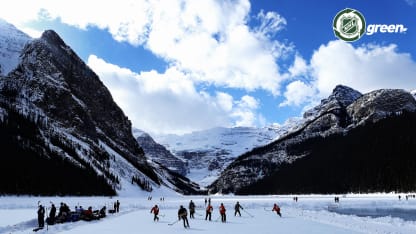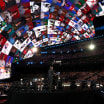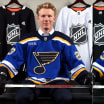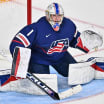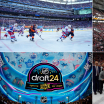Since then, the League and BEF have helped restore more 70 million gallons of water to freshwater sources in North America through the Gallons for Goals program, the League's commitment to match 1,000 gallons of water to a critically dewatered river for every goal scored. Ambitions were high, but BEF CEO Todd Reeve admitted it wasn't to this degree. He initially didn't recognize how influential a platform the NHL can be. But seeing League representatives such as Omar Mitchell, vice president of corporate and social responsibility for NHL Green, resonate with others while speaking about the initiative, struck a chord.
"They've taken this to a higher level," Reeve said. "I don't know if that was all built in with the launch of NHL Green or that's been an evolution of the thinking, but with our partnership with the NHL I feel like both sides have evolved and the NHL's ability to articulate the value propositions and need of opportunity around water has been really, really strong -- far beyond what I imagined it might be.
"I think the NHL has done a better job than almost any company I've seen talk about it, of really making that value proposition. In that sense I think it's evolved into much more of a sophisticated messaging platform than we ever anticipated when we first started working together in a very small way."
Over time, the movement was expanded with participation in the Bridgestone NHL Winter Classic and engaging League employees about water conservation awareness. The League was used as a brand to raise awareness about water issues and the value of fresh water. During the 2016 Stanley Cup Final, about 1 million gallons of fresh water were used to furnish the ice and the arenas, according to Reeve, and 6.5 million gallons have been raised through Gallons for Goals.
"What began as a modest relationship has really built into a situation where the League is a leader in the professional sports arena in terms of messaging around water, taking action to achieve on the ground, improvements in fresh water and using the League's capacity to engage fans and raise awareness around water," Reeve said.
"The first time that the League made a commitment to balance the Stanley Cup Final, we got more interest, more publicity, more articles, more other companies, entities, etc. considering this, and talking with us and making commitments to do this than we ever have otherwise. For us it's been an incredible privilege to be able to work with the League and tap into some of their innovation and their messaging and their thinking as a brand. It's given us more credibility than so many things that we've done."
The NHL also launched NHL.com/GreenerRinks as a focal point of its NHL Green Week activities. One focus is working with arenas to reduce potable-water consumption by upgrading water-efficient fixtures and ice-making technology. Fans are also being encouraged to save water with steps including turning off taps while brushing their teeth and cutting down the length of showers.
Reeve's vision is the day when thousands of companies pledge the kind of commitment the NHL has made and make it business as usual. That's ambitious for sure, but Reeve's initial standards were already greatly surpassed, so why stop now?
"We're trying to grow a movement," Reeve said. "We're trying to engage new companies, new leagues, new universities. We're trying to get everybody involved to make commitment in their own lives to conserve."
